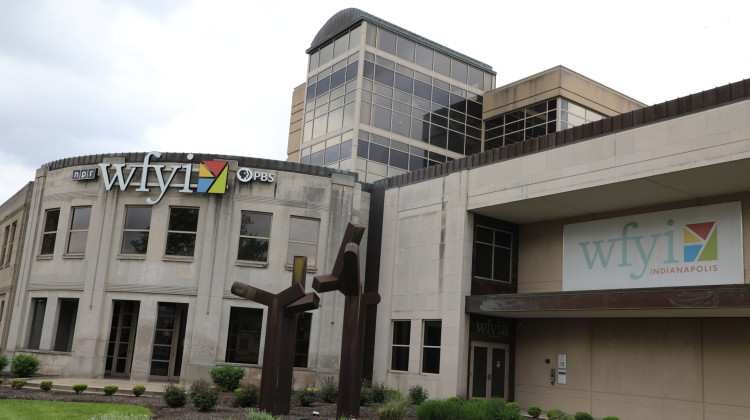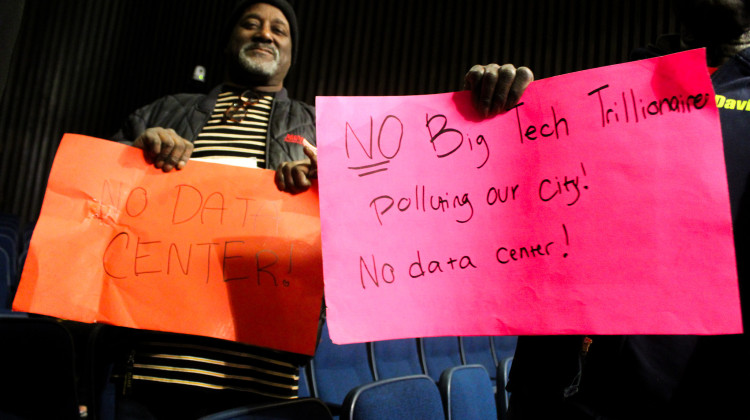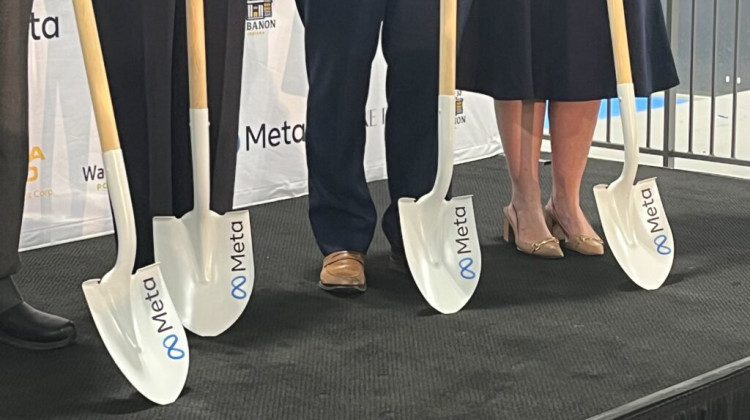WFYI is bracing for a major financial hit after Congress approved a Trump administration rescission bill late Thursday that eliminates previously approved funding for the Corporation for Public Broadcasting, cutting $1.1 billion from public radio and television stations nationwide.
The move will slash WFYI’s budget by more than $1.5 million — 11 percent of its total funding — and comes just months after Indiana lawmakers ended state support for public media.
The dual blow totals a loss of $2.1 million from the annual operation budget, according to station management. It places a new strain on WFYI’s ability to provide independent journalism, educational programming and cultural content to audiences across Central Indiana.
WFYI President and CEO Greg Petrowich said the funding cut directly threatens WFYI’s ability to serve Indiana’s communities.
“The loss of both federal and state funding is not just a setback; it’s a direct threat to our ability to serve the people of Indiana. We are deeply concerned about the impact this will have on our viewers and listeners across the state,” Petrowich said in a statement. “Our commitment to our mission remains, to deliver trusted journalism, inspiring stories and lifelong learning.”
Congressional vote falls along party lines
The U.S. House passed the Senate version of the rescission bill 216-213, with two Republicans voting against it and no Democrats voting in favor. Earlier, the U.S. Senate passed the measure 51-to-48, largely along party lines. Indiana’s U.S. Sens. Jim Banks and Todd Young, both Republicans, supported the defunding.
The bill goes next to President Donald Trump for his signature.
The bill claws back funding that had been allocated for 2026 and 2027. WFYI officials said the majority of CPB funds typically arrive at the start of the federal fiscal year in October. NPR gets about 1% of its budget directly from the federal government, while around 15% of PBS’ budget comes from federal funding.
Impact on local stations could be severe
The CPB has historically functioned as a financial backbone for local stations. It distributes federal funds to public media stations across the country. The loss of funding will be especially acute in rural areas, where public stations often serve as a main source of local news and emergency alerts.
Stations in smaller markets, where philanthropic and corporate donations are harder to secure, typically depend more on CPB.
On average, TV stations rely more on federal funding than radio stations, according to an analysis by Current, which covers public media.
In Indiana, the stations that are most dependent on federal funding are Muncie-based Ball State Public Media, which receives nearly 45% of its budgets from federal sources, and Evansville-based WNIN Tri-State Public Media, which receives almost 43% of funding from federal sources, according to a WFYI analysis.
Nationally, many public broadcasters receive more than 50 percent of their budgets from the CPB and could close because of the funding loss, The New York Times reported.
Political pressure drives the defunding
President Donald Trump sent the rescission request to Congress while accusing NPR and PBS of left-wing bias. He also said he would retaliate politically against any Republican lawmakers who voted against the package.
In a statement following the vote, NPR CEO Katherine Maher said the impact will be "an unwarranted dismantling of beloved local civic institutions.”
"Public funding has enabled the flourishing of a uniquely American system of unparalleled cultural, informational, and educational programming, and ensured access to vital emergency alerting and reporting in times of crisis — all for about $1.60 per American, every year. Parents and children, senior citizens and students, tribal and rural communities — all will bear the harm of this vote," Maher said.
Cuts could 'silence' Indiana public media
This decision follows a series of cuts and political pressure on public media institutions across the country. In April, Indiana lawmakers eliminated $3.7 million in annual funding for Indiana Public Broadcasting Stations — a collaborative network of 17 radio and television newsrooms across the state. WFYI directly lost $590,000 in state funding, or 5% of its total budget.
Following the loss of state funding, Indiana stations decided to eliminate its statewide reporting team at the end of the year.
It is unclear how the federal cuts will impact staffing and services at WFYI and WBAA in West Lafayette. In 2022, Purdue University transferred and sold WBAA's radio license to WFYI. The two stations’ budgets are combined.
Petrowich said cutting this funding could silence one of the few remaining nonpartisan, accessible sources of information and education.
“At a time when truth is being politicized, WFYI and WBAA stand as a vital, nonpartisan resource harnessing the full power of our airwaves to meet audiences where they are on every platform, including radio, television, digital and social media,” he said in a statement. “WFYI and WBAA aren’t just a service, they are a lifeline. This funding loss threatens to silence one of the last remaining places where news, education, the arts, culture, and civic dialogue are freely accessible to everyone, from early childhood through adulthood, and not just for those who can afford it.”
CPB funds are used to support a range of initiatives at stations — from local news reporting and statewide collaborations to television programming and outreach partnerships with schools and libraries. WFYI’s popular local programs include Indiana Week in Review and Cultural Manifesto.
WFYI Public Media was founded in 1970. The nonprofit operates radio and television licenses, including: PBS member television across three digital channels — WFYI 1 (PBS), WFYI 2 (PBS Kids) and WFYI 3 (Create) — and NPR-affiliated radio on 90.1 FM and music on HD-2 The Point XPonential Radio Streaming.
WBAA broadcasts on WBAA News AM920 and 105.9 FM, WBAA Classical 101.3 FM and WBAA HD-2 Jazz Streaming.
Disclosure: This story was reported and written by WFYI managing editor Eric Weddle and edited by education reporter Dylan Peers McCoy. In following NPR’s protocol for reporting on itself, no WFYI or IPBS executive reviewed this story before it was posted publicly.
 DONATE
DONATE







 Support WFYI. We can't do it without you.
Support WFYI. We can't do it without you.